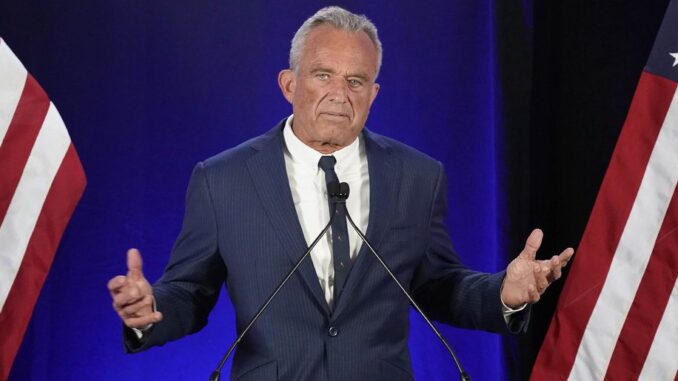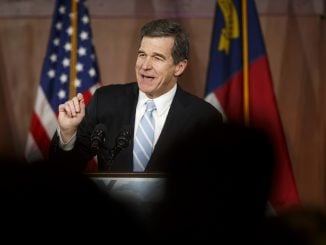
RALEIGH — The North Carolina Supreme Court ordered the North Carolina State Board of Elections to remove Robert G. Kennedy Jr. from the state’s November ballot in an opinion issued on Monday evening.
Kennedy is the presidential candidate for the We The People Party, which first fought to keep his name on the ballot but then requested removal from the ballot after Kennedy endorsed former President Donald Trump.
“We acknowledge that expediting the process of printing new ballots will require considerable time and effort by our election officials and significant expense to the State,” wrote Associate Justice Trey Allen for the majority. “But that is a price the North Carolina Constitution expects us to incur to protect voters’ fundamental right to vote their conscience and have that vote count.”
The court criticized the State Board of Elections for its handling of Kennedy’s withdrawal, noting that they were aware of his intentions but continued with ballot preparation anyway.
“We decline to grant defendants extraordinary relief when they are responsible for their own predicament,” Allen wrote.
The 4-3 ruling had Anita Earls and Allison Riggs, the two Democrats on the court, and Richard Dietz, a Republican, dissenting.
Dietz argued that the NCSBE’s decision not to reprint ballots was reasonable and supported by election laws. He contended that while candidates have the right to resign, this doesn’t automatically grant them “an absolute right to have her name added to the ballot in place of the candidate who resigned.”
Riggs said the decision causes “egregious and unjustified” harm to voters and election administrators, violates state law, and improperly shortens the absentee voting period. She also contends there is no statutory right for Kennedy to be removed from the ballot at this stage, stating the relevant law “does not say a nominated candidate has a right to withdraw.”
Earls’ dissent was similar to Riggs’, adding concern for potential voter confusion and the substantial costs and efforts required to reprint ballots. She also questions the legal basis for Kennedy’s request, writing that the statute he relies on “actually does not apply to him.”
The NCSBE issued a statement on the Supreme Court’s ruling, indicating the state may not meet the 45-day deadline in federal law of September 21 for distribution of military and overseas ballots to voters.
“We will continue to consult with counties and ballot vendors to determine the feasible start date for distributing absentee ballots statewide, mindful of the goal to meet the 45-day federal deadline,” said Karen Brinson Bell, executive director of the State Board of Elections. “This decision imposes a tremendous hardship on our county boards, at an extremely busy time. But our election officials are professionals, and I have no doubt we will rise to the challenge.”
The NCSBE press release says they have “begun discussions with the U.S. Department of Defense to seek a potential waiver of that deadline, if ballots are not ready in all counties by that date.”
The release notes 2,348 different ballot styles statewide for the 2024 general election and that “more than 2.9 million individual ballots had been printed before the court order.”
The same day as the N.C. Supreme Court issued its ruling removing Kennedy, the Supreme Court in Michigan issued an order keeping him on that state’s ballot. The court’s order was unsigned, and dissent came from two Republican justices.
While the North Carolina Supreme Court is a 5-2 Republican majority, the Michigan Supreme Court makeup is currently a 4-3 Democrat majority.
“We can only hope that the Secretary’s misguided action — now sanctioned with the imprimatur of this Court — will not have national implications,” wrote the two dissenting justices.
Per The Associated Press, Kennedy attorney Aaron Siri issued two statements — one criticizing the Michigan ruling and another on North Carolina decision, which said in part that the N.C. ruling “will assure that nobody in North Carolina votes for a candidate who is no longer running in their state.”
The Supreme Court’s order was in response to requests from the NCSBE appealing the Sept. 6 state Court of Appeals order that enjoined the board from distributing ballots that have Kennedy’s name on them.
The NCSBE voted 3-2 to keep Kennedy on the ballot during an emergency meeting Aug. 29. The reasons cited were cost and impracticality of reprinting new ballots. Some 1.7 million had already been printed by that date, and Brinson Bell said the cost for reprints could be in the “high six-figure range.”
Attorneys for Kennedy then filed a lawsuit to force the NCSBE to remove his name.
Wake County Superior Court Judge Rebecca Holt denied the request but gave Kennedy’s lawyers 24 hours to appeal. Phil Strach, an attorney for Kennedy in the case, did file a motion for a temporary stay and a petition for a writ of supersedeas with the North Carolina Court of Appeals which was unanimously granted today.
The Court of Appeals order that followed put Holt’s Sept. 5 order on hold, prohibiting the NCSBE from distributing ballots that list Kennedy as a presidential candidate until either Kennedy’s appeal was resolved or until the court issued another order.
According to a Sept. 5 NCSBE press release issued after Holt’s ruling, county boards of election were set to begin sending ballots out on Sept. 6, “the deadline for absentee ballot distribution under state law.” The NCSBE release also said during the meeting that county boards of elections had received “130,400 absentee ballot requests, including more than 12,300 requests from military and overseas voters.”
North State Journal contacted the NCSBE for comment after the Court of Appeals order, and a letter from NCSBE’s Counsel Paul Cox was shared. The letter was sent to county boards of election telling them not to send out any ballots.
“The Court of Appeals just issued an order reversing the denial of the restraining order that was requested by Kennedy. It is attached. The court has ordered a further pause to ballot distribution. Do not send any ballots out today,” wrote Cox.
In a press release issued in the evening following the Court of Appeals order, the NCSBE said the agency had filed an appeal with the North Carolina Supreme Court and asked for an expedited decision.
The release said there are 2,348 different ballot styles statewide for the upcoming November election and there are currently “more than 2.9 million ballots” that had already been printed prior to the Court of Appeals issuing its order.
Brinson Bell also asked county boards to make sure absentee voters get their ballots no later than the federal deadline of Sept. 21. If the ballots can’t go out due to reprinting, the state may need to request a waiver.




